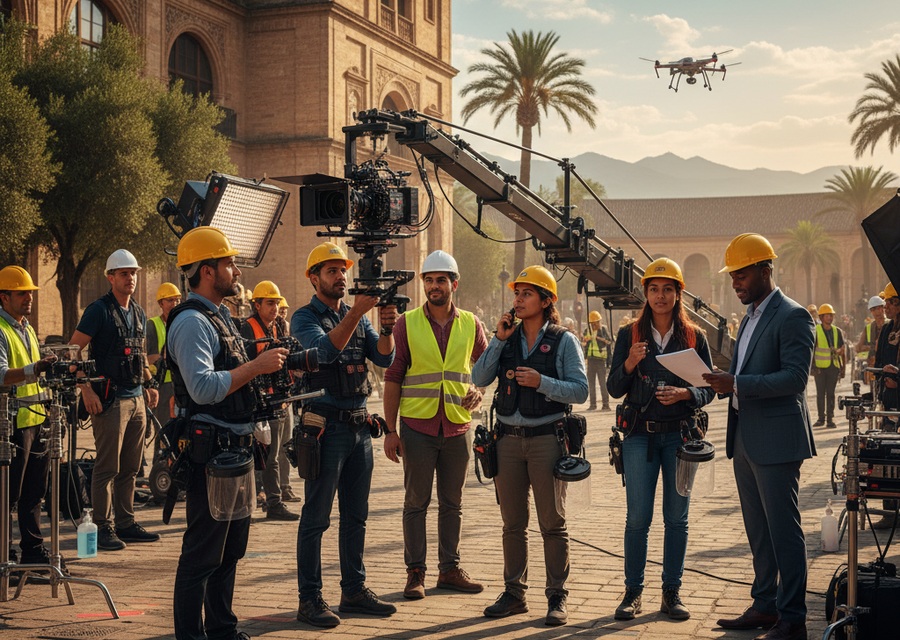CDC Shooting: Unveiling the Vaccine Misinformation Crisis
- THE MAG POST

- Aug 11, 2025
- 11 min read

The CDC shooting and vaccine misinformation crisis is a serious issue. This incident at the CDC headquarters in Atlanta, resulting in a police officer's death, highlights the dangers of rampant misinformation about vaccines. It's crucial to understand how false narratives can lead to tragic outcomes. We need to address the root causes of vaccine hesitancy and promote accurate information. By fostering trust and critical thinking, we can prevent future incidents and protect public health. Let's explore the facts and work towards a more informed society.
In a tragic turn of events, a shooting at the Centers for Disease Control and Prevention (CDC) headquarters in Atlanta resulted in the death of a police officer, sending shockwaves through the public health community. This devastating incident has ignited discussions about the growing wave of misinformation surrounding vaccines and its potential consequences. The incident underscores the critical need for accurate information and responsible dialogue in public health matters, especially concerning vaccine safety and efficacy. Understanding the roots of vaccine hesitancy and addressing public concerns through transparent and evidence-based communication are essential steps in preventing future tragedies. The shooting serves as a stark reminder of the real-world impact of misinformation and the importance of fostering trust in public health institutions.
Understanding the CDC Shooting and Vaccine Misinformation
The Atlanta CDC shooting, which claimed the life of a dedicated police officer, has brought the issue of vaccine misinformation into sharp focus. The shooter, a 30-year-old man, reportedly believed that the COVID-19 vaccine had caused him harm, leading him to commit this horrific act. This tragic event highlights the dangerous consequences of the rampant spread of false information and conspiracy theories about vaccines. The incident underscores the urgent need for public health officials, media outlets, and community leaders to actively combat misinformation and promote accurate, science-based information about vaccines. Only through collective efforts can we hope to prevent future tragedies fueled by unfounded fears and beliefs surrounding vaccine safety and efficacy. The CDC shooting is a wake-up call for all stakeholders to prioritize public health education and communication.
The aftermath of the CDC shooting has prompted investigations by local, state, and federal law enforcement agencies to uncover the full details and circumstances that led to the attack. These investigations aim to understand the shooter's motivations, his sources of information, and the extent to which misinformation played a role in his actions. The findings of these investigations will be crucial in developing strategies to prevent similar incidents in the future. By analyzing the factors that contributed to the shooting, law enforcement and public health officials can gain valuable insights into the spread of misinformation and the potential for violence it can incite. The CDC shooting serves as a case study for understanding the complex interplay between misinformation, mental health, and public safety.
The CDC shooting occurred against a backdrop of escalating political hostility toward the CDC and other public health agencies. Some federal officials have attempted to blame these agencies for lockdowns and vaccine mandates implemented during the COVID-19 pandemic. This political climate has further fueled the spread of misinformation and conspiracy theories, creating a hostile environment for public health workers and undermining trust in scientific expertise. The CDC shooting serves as a stark reminder of the real-world consequences of political polarization and the erosion of trust in public institutions. It is essential for political leaders to prioritize public health and support evidence-based policies, rather than spreading misinformation and undermining the work of dedicated public health professionals.
The CDC shooting also highlights the need for greater mental health support and resources for individuals struggling with vaccine-related anxieties and concerns. While misinformation can play a significant role in shaping beliefs and attitudes, underlying mental health issues can exacerbate these fears and lead to extreme actions. Public health officials and mental health professionals must work together to provide accessible and compassionate support for individuals who are experiencing vaccine hesitancy or anxiety. By addressing the underlying emotional and psychological factors that contribute to vaccine hesitancy, we can help prevent future tragedies and promote a more informed and rational approach to public health decision-making. The CDC shooting underscores the importance of integrating mental health services into public health initiatives.
In response to the CDC shooting, public health experts and community leaders have called for a renewed commitment to combating vaccine misinformation and promoting public health literacy. They emphasize the need for proactive communication strategies that address public concerns, debunk myths, and provide accurate information about vaccine safety and efficacy. These strategies should involve collaboration between public health agencies, healthcare providers, community organizations, and media outlets to ensure that accurate information reaches diverse audiences. By empowering individuals with the knowledge and resources they need to make informed decisions about their health, we can build trust in public health institutions and prevent future tragedies like the CDC shooting. The focus should be on promoting critical thinking skills and media literacy to help individuals discern credible sources of information from unreliable ones.
Details Emerge: The CDC Shooting Incident and Aftermath
The CDC shooting unfolded on a Friday afternoon when Atlanta police received a 911 call reporting an active shooter at a CVS drugstore located across the street from the CDC headquarters on Clifton Road. This location is near the Emory University campus and Emory University Hospital, a bustling area with a high volume of pedestrian and vehicular traffic. The choice of location suggests that the shooter may have been targeting the CDC specifically, or that the CVS drugstore was simply a convenient starting point for his attack. The proximity to Emory University and its hospital also raises concerns about the potential for further casualties and the need for heightened security measures in the area. The CDC shooting serves as a reminder of the vulnerability of public institutions and the importance of proactive security measures.
The CDC shooting resulted in dozens of bullets striking the exterior of at least four CDC buildings, causing damage to windows and pitting the structures' sleek glass facade. Miraculously, no CDC employees or civilians were injured during the attack, which is a testament to the quick response of law enforcement and the safety protocols in place at the CDC. The damage to the buildings, however, serves as a visible reminder of the violence that occurred and the potential for further attacks. The CDC shooting has prompted a review of security measures at the CDC and other public health institutions to ensure the safety of employees and visitors. The focus is on enhancing physical security, improving emergency response procedures, and providing training for employees on how to respond to active shooter situations.
The CDC shooting has prompted a wave of grief and support from the public health community, who are mourning the loss of the DeKalb County police officer who was killed in the attack. The officer, whose name has not been released, is being hailed as a hero for his bravery and dedication to protecting the community. The public health community recognizes the sacrifices made by law enforcement officers and other first responders who put their lives on the line every day to ensure public safety. The CDC shooting serves as a reminder of the importance of supporting law enforcement and providing them with the resources they need to protect themselves and the communities they serve. The public health community is committed to working with law enforcement to prevent future tragedies and promote a safer and healthier society.
The CDC shooting has also raised questions about the role of social media in spreading misinformation and inciting violence. The shooter's online activity is being scrutinized to determine whether he was influenced by extremist groups or conspiracy theories. Social media platforms have come under increasing pressure to crack down on the spread of misinformation and hate speech, but critics argue that they are not doing enough to protect public safety. The CDC shooting highlights the need for greater accountability and transparency from social media companies in addressing the spread of harmful content. The focus is on developing effective strategies to identify and remove misinformation, promote media literacy, and counter extremist narratives online.
In the wake of the CDC shooting, public health experts are emphasizing the importance of evidence-based decision-making and the need to trust scientific expertise. They argue that misinformation and conspiracy theories can have deadly consequences, and that it is essential to rely on credible sources of information when making decisions about health and safety. The CDC shooting serves as a reminder of the importance of public health education and communication in promoting informed decision-making. The focus is on developing effective strategies to communicate complex scientific information in a clear and accessible way, and to address public concerns and anxieties about vaccines and other public health issues. The goal is to empower individuals to make informed choices that protect their health and the health of their communities.
Addressing Vaccine Misinformation After the CDC Shooting
The CDC shooting has underscored the urgent need to address vaccine misinformation and its potential consequences. Vaccine misinformation refers to false or misleading information about vaccines that can lead to vaccine hesitancy and refusal. This can have serious implications for public health, as vaccines are one of the most effective tools for preventing infectious diseases. The CDC shooting serves as a stark reminder of the real-world impact of misinformation and the importance of promoting accurate, science-based information about vaccines. The focus is on developing effective strategies to counter misinformation and build trust in vaccines.
One of the key strategies for addressing vaccine misinformation is to improve public health literacy. Public health literacy refers to the ability of individuals to understand and use health information to make informed decisions. This includes the ability to critically evaluate health information, identify credible sources, and understand the risks and benefits of vaccines. The CDC shooting highlights the need for greater emphasis on public health education in schools and communities. The focus is on developing effective curricula and programs that teach individuals how to evaluate health information and make informed decisions about their health.
Another important strategy for addressing vaccine misinformation is to engage with communities and address their concerns. Vaccine hesitancy is often rooted in fear, mistrust, and cultural beliefs. It is important to listen to these concerns and address them with empathy and respect. The CDC shooting serves as a reminder of the importance of building trust between public health officials and communities. The focus is on developing culturally sensitive communication strategies that address the specific concerns of different communities. This includes working with community leaders and trusted messengers to disseminate accurate information about vaccines.
Social media platforms also have a responsibility to address vaccine misinformation. Social media has become a major source of information for many people, and it is also a breeding ground for misinformation. Social media platforms need to take steps to identify and remove false or misleading information about vaccines. They also need to promote accurate information from credible sources. The CDC shooting serves as a reminder of the potential for social media to spread misinformation and incite violence. The focus is on developing effective strategies to combat misinformation on social media and promote responsible online behavior.
Finally, it is important to hold individuals and organizations accountable for spreading vaccine misinformation. Spreading false or misleading information about vaccines can have serious consequences for public health. Individuals and organizations that spread misinformation should be held accountable for their actions. This includes taking legal action against those who intentionally spread misinformation and working to deplatform those who repeatedly violate social media policies. The CDC shooting serves as a reminder of the importance of accountability in addressing vaccine misinformation. The focus is on developing effective strategies to deter the spread of misinformation and protect public health.
The Broader Impact: CDC Shooting and Public Trust
The CDC shooting has had a profound impact on public trust in public health institutions. The CDC is a leading public health agency that plays a critical role in protecting the health of the nation. The shooting has raised concerns about the safety and security of CDC employees and the ability of the agency to carry out its mission. The CDC shooting serves as a reminder of the importance of protecting public health institutions and ensuring that they have the resources they need to protect the public's health. The focus is on restoring public trust in the CDC and other public health agencies.
One of the key ways to restore public trust in public health institutions is to be transparent and accountable. Public health agencies need to be open and honest about their policies and practices. They also need to be accountable for their actions. The CDC shooting serves as a reminder of the importance of transparency and accountability in building public trust. The focus is on developing effective strategies to communicate with the public in a clear and transparent way, and to hold public health officials accountable for their actions.
Another important way to restore public trust in public health institutions is to engage with communities and address their concerns. Public health agencies need to listen to the concerns of communities and address them with empathy and respect. The CDC shooting serves as a reminder of the importance of community engagement in building public trust. The focus is on developing culturally sensitive communication strategies that address the specific concerns of different communities. This includes working with community leaders and trusted messengers to disseminate accurate information about public health issues.
Public health agencies also need to work to counter misinformation and build trust in science. Misinformation can erode public trust in science and make it difficult to implement effective public health policies. The CDC shooting serves as a reminder of the importance of combating misinformation and promoting scientific literacy. The focus is on developing effective strategies to counter misinformation and build trust in science. This includes working with educators, scientists, and media outlets to promote accurate information about public health issues.
Finally, it is important to remember that restoring public trust in public health institutions is a long-term process. It will take time and effort to rebuild trust after the CDC shooting. However, by being transparent, accountable, engaging with communities, and countering misinformation, public health agencies can restore public trust and protect the health of the nation. The CDC shooting serves as a reminder of the importance of public trust in public health institutions and the need to work to restore that trust.
Moving Forward: Lessons from the CDC Shooting
The CDC shooting offers several important lessons for public health officials, law enforcement, and the community as a whole. One of the most important lessons is the need to address vaccine misinformation and its potential consequences. Vaccine misinformation can lead to vaccine hesitancy and refusal, which can have serious implications for public health. The CDC shooting serves as a stark reminder of the real-world impact of misinformation and the importance of promoting accurate, science-based information about vaccines. The focus should be on developing effective strategies to counter misinformation and build trust in vaccines.
Another important lesson from the CDC shooting is the need to protect public health institutions and ensure the safety of public health workers. Public health institutions play a critical role in protecting the health of the nation, and public health workers are on the front lines of this effort. The CDC shooting has raised concerns about the safety and security of public health institutions and the need to provide public health workers with the resources they need to protect themselves. The focus should be on enhancing security measures at public health institutions and providing public health workers with training on how to respond to active shooter situations.
The CDC shooting also highlights the need for greater collaboration between public health officials and law enforcement. Public health officials and law enforcement need to work together to prevent violence and protect public safety. The CDC shooting serves as a reminder of the importance of communication and coordination between public health officials and law enforcement. The focus should be on developing effective protocols for sharing information and coordinating responses to public health emergencies.
The CDC shooting also underscores the importance of addressing mental health issues. The shooter in the CDC shooting reportedly had a history of mental health problems. Mental health issues can contribute to violence and other harmful behaviors. The CDC shooting serves as a reminder of the importance of providing access to mental health services and addressing the stigma associated with mental illness. The focus should be on expanding access to mental health services and promoting mental health awareness.
Finally, the CDC shooting highlights the need for community involvement in preventing violence and promoting public health. Communities can play a critical role in identifying and addressing potential threats to public safety. The CDC shooting serves as a reminder of the importance of community engagement in preventing violence and promoting public health. The focus should be on empowering communities to take ownership of their health and safety and to work together to create a safer and healthier society. This includes promoting community-based violence prevention programs and fostering a culture of respect and understanding.
From our network :
Creating DB2 Tables with AS Clause and Specifying Tablespace
Python Shapefile Plotting: Visualizing Geographic Data with Basemap
Gemini AI: A Good Chatbot But Still a Bad Assistant? Examining the Flaws
New Types of Infinity Challenge Traditional Views in Set Theory
Detecting ER Protein Synthesis Problems: A Novel Reporter System
Understanding Linear and Circular Motion: Concepts and Applications






















































Comments